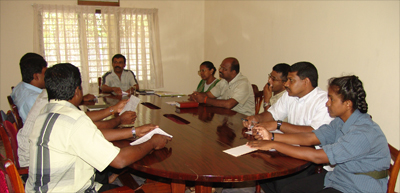Ilankai Tamil Sangam30th Year on the Web Association of Tamils of Sri Lanka in the USA |
|||
 Home Home Archives Archives |
Child Protection Authority Studies the Rock Reportby the LTTE Peace Secretariat, February 14, 2007
The Child Protection Authority in Kilinochchi met today to examine the contents of the Rock report. The Rock report, the report by UN Special Representative Allan Rock, was submitted to the UN Security Council Working Group on Children Affected by Armed Conflict in Sri Lanka, on 9 February 2007. The Rock report while noting progress in the release of underage youths in the LTTE ranks noted that the commitment made to him by LTTE when he was in Kilinochchi in November 2006 has not been fulfilled 100%.
At today’s meeting, CPA unanimously agreed that the commitment made to Allan Rock by LTTE in November 2006 must be upheld even though there have been unavoidable delays. The key commitments made by LTTE to Allan Rock are, to release all underage youths within the LTTE ranks and to stop recruiting underage youths. Although Ambassador Rock urged the LTTE to set the minimum age at 18, LTTE’s commitment was to observe the minimum age of 17. LTTE has assured the CPA that it stands by this commitment and the release program will continue with the aim of completing the process as soon as possible. As noted in the Rock report, LTTE takes the position that it is not covered by Article 4 of the Optional Protocol to the Convention on the Rights of Child on “Children Affected by Armed Conflict”, which states, “Armed groups that are distinct from the armed forces of a State should not, under any circumstances, recruit or use in hostilities persons under the age of 18 years.” On the other hand, Convention on the Rights of Child permits the armed forces of the State to recruit those over the age of 15. LTTE provides extensive civil services in many areas of civilian life such as, health, education, child care, law-and-order, and environmental protection in which LTTE members take part. That only in LTTE areas in this island there are no children or women begging in the street attest to the extensive social welfare services provided by the LTTE. Many young persons entering the LTTE ranks are also trained as doctors, engineers, and in many other professions. LTTE is therefore no longer an “armed group” but is indeed a defacto-state. A functioning defacto-state like the LTTE is entitled to recruit those above the age of 17 but not send them to the battle front. Representatives of the UN have argued that LTTE must adhere to the minimum age of 18 as it has agreed in previous agreements made to UN bodies. The most cited agreement where the minimum age of 18 was agreed to by the LTTE was the Action Plan of 2003. Action Plan was one of many agreements reached during the early ceasefire period as part of the peace process. Other notable agreements were, a Secretariat for Immediate Humanitarian Rehabilitation in North East (SIHRNE), Subcommittee on De-escalation and Normalization (SDN), and Post Tsunami Operation Management Structure (PTOMS). All of these agreements, including the Action Plan, have become defunct. It is, therefore, not right to hold LTTE to a clause in one agreement when the other parties conveniently abrogated their obligations under it and under all other agreements reached at the same time as part of the peace process. LTTE, however, is ready to observe the minimum age of 18 when this has been accepted as an international standard by all the states. |
||
|
|||
